-
01-01-2015
Quality of life and physical activity in intensive care professionals from middle São Francisco
Revista Brasileira de Enfermagem. 2015;68(1):26-31
Abstract
Quality of life and physical activity in intensive care professionals from middle São Francisco
Revista Brasileira de Enfermagem. 2015;68(1):26-31
DOI 10.1590/0034-7167.2015680104i
Views0See moreObjective:
the objective was to assess the level of physical activity (LPA) and the quality of life QL of the professionals who work in ICU.
Method:
this was a cross-sectional study carried out in Adult ICUs. LPA was assessed by the International Questionnarie of Physical Activity – short form (IQPA-SF) and the QL by the Medical Outcomes Study 36 (SF-36) questionnaire.
Results:
it was classified active 50.89% out of a total of 59 professionals. Nursing technicians were considered the most active with 60.6%. The QL of the professionals who were considered active were better when compared to inactives, with statistical differences to the category of physical aspects limitation, social aspects and mental health. The working hours were higher than recommend, the physicians were higher than the physical therapist, nurses and technicians nurses (p = 0.046).
Conclusion:
physically active professionals who work in ICU had higher quality of life probably why have lower hours of work and consequently more free time to engage in physical activity.

-
01-01-2015
Learning needs of Nursing students in technical vocational education
Revista Brasileira de Enfermagem. 2015;68(1):20-25
Abstract
Learning needs of Nursing students in technical vocational education
Revista Brasileira de Enfermagem. 2015;68(1):20-25
DOI 10.1590/0034-7167.2015680103i
Views0See moreObjective:
identify learning needs of students of Technical Vocational Education (TVE) in Nursing. Qualitative study conducted in a city of São Paulo state.
Method:
the subjects were students, teachers and coordinators of TVE and students of the bachelor degree who have had contact with TVE. Data collection was performed by questionnaire socioeconomic and cultural circles about the learning needs. For data analysis we used the content analysis.
Results:
it was found that students have difficulties contents not related to nursing as portuguese and mathematics, as well as introductory courses in the course of TVE which possibly may interfere negatively in learning specific content of nursing and the quality of health care.
Conclusion:
it is necessary to rethink the content taught and ways to teach from basic education, as well as the training of teachers who now works in the TVE.
-
01-01-2015
Serious game e-Baby: nursing students’ perception on learning about preterm newborn clinical assessment
Revista Brasileira de Enfermagem. 2015;68(1):13-19
Abstract
Serious game e-Baby: nursing students’ perception on learning about preterm newborn clinical assessment
Revista Brasileira de Enfermagem. 2015;68(1):13-19
DOI 10.1590/0034-7167.2015680102i
Views0See moreObjective:
to evaluate students opinion regarding e-Baby educational technology.
Methodology:
exploratory descriptive study in which participated a sample composed of 14 nursing Portuguese students that used e-Baby digital educational technology in an extracurricular course. To achieve the aim of the study, the data collection was realized through an opinion instrument in Likert scale including the possibility of commentaries by students. Is was also collected data of participants’ characterization.
Results:
students made very satisfactory evaluations regarding the game e-Baby, varying since usability acceptation through suggestions of expansion of the game to other nursing themes.
Conclusion:
serious game e-Baby can be considered a didactic innovation and motivator tool of learning. Besides, it demonstrates have adequate interface in design and educative function aspects, evocating intense interaction between user and computational tool.

-
01-01-2015
Challenges beyond the scientific knowledge production
Revista Brasileira de Enfermagem. 2015;68(1):7-8
Abstract
Challenges beyond the scientific knowledge production
Revista Brasileira de Enfermagem. 2015;68(1):7-8
DOI 10.1590/0034-7167.2015680101p
Views0For several decades, innumerous appeals and reflections on how to build the nursing science and achieve visibility in the scientific world led researchers to make efforts to produce knowledge that contributed to the well-being of people, improving their quality of life, relieving their suffering and transforming the reality in which we live. In addition to […]See more
-
ORIGINAL ARTICLE10-09-2023
Construction and validation of a scenario for recognizing sepsis by nursing students: a methodological study
Revista Brasileira de Enfermagem. 2023;76(4):e20220537
Abstract
ORIGINAL ARTICLEConstruction and validation of a scenario for recognizing sepsis by nursing students: a methodological study
Revista Brasileira de Enfermagem. 2023;76(4):e20220537
DOI 10.1590/0034-7167-2022-0537
Views0See moreABSTRACT
Objective:
To build and validate a clinical simulation scenario for teaching Nursing students about early recognition of signs and symptoms of sepsis in the context of the emergency unit.
Methods:
Methodological study developed in two phases: construction of a simulated scenario and content validation by expert judges. For data analysis, the Content Validity Index (CVI) was calculated considering agreement equal to or greater than 80%. The minimum acceptable CVI value for scenario validation was 1.0.
Results:
The simulation scenario proved to be appropriate, with a global Content Validity Index equal to 1. Some adjustments related to the clarity of the wording were necessary, as suggested by the judges. Conclusions: A medium-complexity, high-fidelity scenario was successfully constructed and validated for teaching early recognition of sepsis signs and symptoms.
-
EXPERIENCE REPORT10-09-2023
Service organization protocol for coping with undergraduate students’ psychological distress: a collective construction
Revista Brasileira de Enfermagem. 2023;76(4):e20220535
Abstract
EXPERIENCE REPORTService organization protocol for coping with undergraduate students’ psychological distress: a collective construction
Revista Brasileira de Enfermagem. 2023;76(4):e20220535
DOI 10.1590/0034-7167-2022-0535
Views0See moreABSTRACT
Objective:
to report on the experience of the elaboration process of a service organization protocol for coping with public undergraduate students’ psychological distress in the countryside of São Paulo.
Method:
experience report on protocol production, an action research product, carried out according to the health care and service organization protocol model, made possible by remote meetings with 33 professionals linked to the management and services of the university’s health and social assistance departments.
Results:
collective protocol production provided an opportunity for an institutional agreement on educational, therapeutic and support actions, to be developed in groups or individually with students, with provision for permanent education with civil servants.
Final considerations:
this experience made it possible to list specific actions to face undergraduate students’ psychological distress, bringing health professionals closer to those in management, promoting the exchange of concepts and practices to re-signify and transform the work developed.
-
ORIGINAL ARTICLE10-09-2023
Performance of Family Health Strategy Nurses in LGBT+ Healthcare
Revista Brasileira de Enfermagem. 2023;76(4):e20220514
Abstract
ORIGINAL ARTICLEPerformance of Family Health Strategy Nurses in LGBT+ Healthcare
Revista Brasileira de Enfermagem. 2023;76(4):e20220514
DOI 10.1590/0034-7167-2022-0514
Views0See moreABSTRACT
Objective:
To analyze the role of Family Health Strategy (FHS) nurses in the health care of LGBT+ individuals.
Methods:
This qualitative study is based on Institutional Analysis. Data was collected in August 2021 through semi-structured interviews with 14 Family Health Strategy nurses from municipalities in the state of São Paulo. The data was processed using the IRaMuTeQ® software and analyzed lexically.
Results:
The textual corpus gave rise to three themes, which addressed the nurses’ practice, the difficulties and challenges they face in providing care to LGBT+ individuals, and the direct association of LGBT+ individuals with sexually transmitted infections.
Conclusion:
Lack of preparedness, access to information, and the need for expanded listening skills are still gaps in the performance of FHS nurses in caring for LGBT+ individuals. However, fostering acceptance and building strong relationships have been effective strategies in bridging the gap in nursing care for the LGBT+ community.
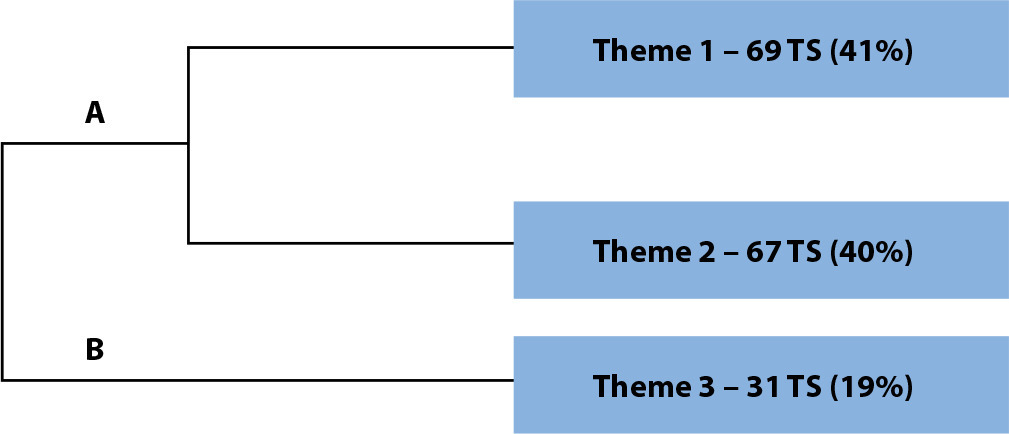
-
ORIGINAL ARTICLE10-09-2023
Perceived stress by mototaxi drivers and its relationship with sociodemographic and occupational characteristics
Revista Brasileira de Enfermagem. 2023;76(4):e20220505
Abstract
ORIGINAL ARTICLEPerceived stress by mototaxi drivers and its relationship with sociodemographic and occupational characteristics
Revista Brasileira de Enfermagem. 2023;76(4):e20220505
DOI 10.1590/0034-7167-2022-0505
Views0See moreABSTRACT
Objective:
To investigate the association of sociodemographic and occupational characteristics with a high level of perceived stress in motorcycle taxi drivers.
Method:
Cross-sectional study carried out with motorcycle taxi drivers who answered instruments on sociodemographic and occupational variables – Perceived Stress Scale, Job Content Questionnaire and Effort-Reward Imbalance. Descriptive statistics, Pearson’s chi-square test and Poisson regression with robust variance were used. Statistical significance was 5%.
Results:
Of the 800 motorcycle taxi drivers, 46.8% had a high level of perceived stress. In the multivariate analysis, a high level of stress was associated with low control over work (PR=7.76; 95%CI=5.19-11.61), low social support at work (PR=3.87; 95%CI =2.95 5.08), working hours longer than eight hours a day (RP=1.47; 95%CI=1.21-1.78) and monthly income less than or equal to two minimum wages (PR=1.34;95%CI=1.13-2.58).
Conclusion:
Long working hours, occupational stressors and low income were associated with a high level of perceived stress. Public policies and interventions to minimize occupational stressors are essential.
-
ORIGINAL ARTICLE10-09-2023
Educational intervention in social skills for Primary Care nurses
Revista Brasileira de Enfermagem. 2023;76(4):e20220503
Abstract
ORIGINAL ARTICLEEducational intervention in social skills for Primary Care nurses
Revista Brasileira de Enfermagem. 2023;76(4):e20220503
DOI 10.1590/0034-7167-2022-0503
Views0See moreABSTRACT
Objective:
to assess an educational intervention on social skills for nurses who work in Primary Health Care.
Method:
a qualitative research-intervention study, carried out in the municipalities covered by the 17th Health Regional of Paraná. It was developed in three interrelated stages: exploratory, where meetings were held with the managers to define the groups and logistics for running the course; intermediate, developed in meetings with different groups of nurses, addressing selected topics; assessment, in which the nurses developed a personal plan to improve their social skills.
Results:
participants were 57 nurses who acted as coordinators of Primary Care. They considered the educational intervention in social skills fundamental for positive changes in their professional performance.
Final considerations:
the educational intervention in social skills was assessed as an important strategy to strengthen the development of nurses’ managerial and care skills.
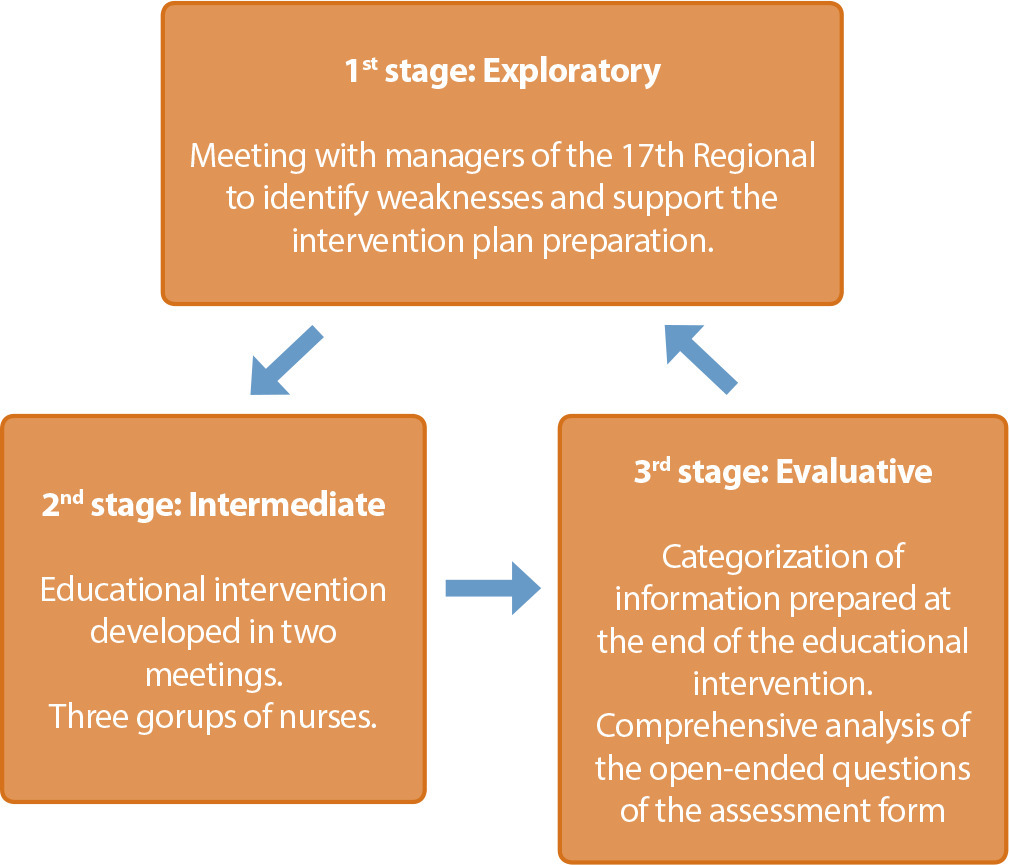
-
ORIGINAL ARTICLE10-09-2023
Spatial and temporal analysis of tuberculosis incidence in Guinea-Bissau, 2018 to 2020
Revista Brasileira de Enfermagem. 2023;76(4):e20220481
Abstract
ORIGINAL ARTICLESpatial and temporal analysis of tuberculosis incidence in Guinea-Bissau, 2018 to 2020
Revista Brasileira de Enfermagem. 2023;76(4):e20220481
DOI 10.1590/0034-7167-2022-0481
Views0See moreABSTRACT
Objective:
to analyze the epidemiological profile, spatial and temporal distribution of tuberculosis in Guinea-Bissau from 2018 to 2020.
Methods:
an ecological study, carried out in Guinea-Bissau, considering new cases of tuberculosis. Spatial analysis of areas was used to verify tuberculosis distribution in the country, and time series were used to identify incidence evolution over the years of study.
Results:
a total of 6,840 new cases of tuberculosis were reported. Tuberculosis incidence rate in the country ranged from 36.8 to 267.7 cases/100,000 inhabitants, with emphasis on the regions of Bissau and Biombo (over 90 cases/100,000). By using time series, it was possible to observe an increase in case incidence over the years of study.
Conclusions:
the study made it possible to identify the epidemiological profile of tuberculosis in Guinea-Bissau, spatial distribution heterogeneity, in addition to identifying the disease evolution over the years of investigation.
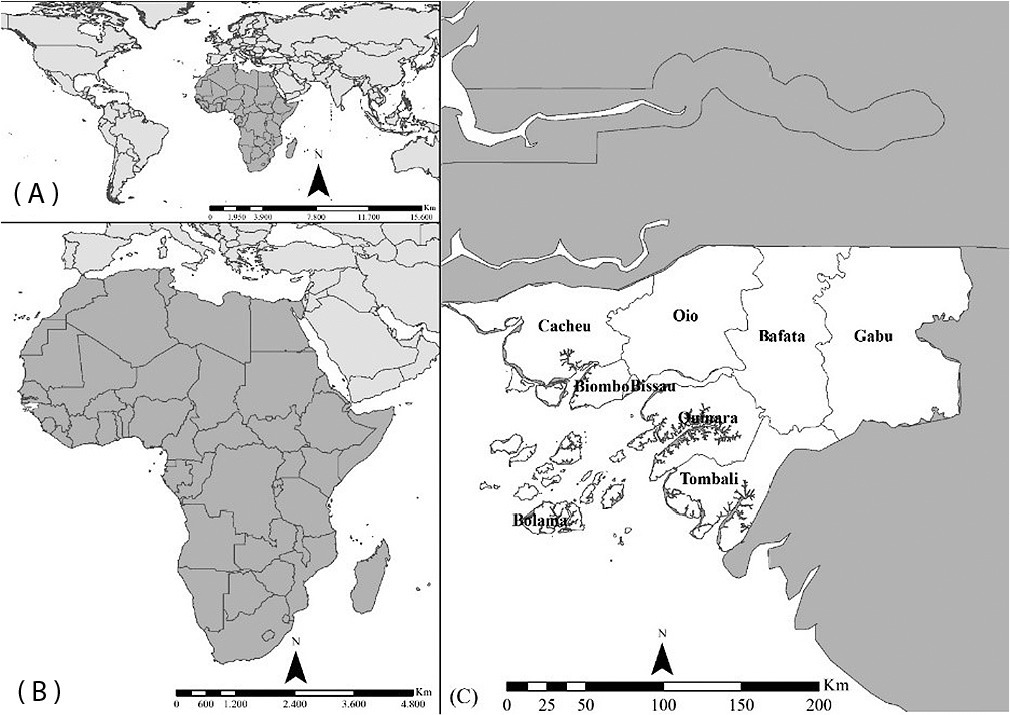
-
ORIGINAL ARTICLE10-09-2023
Eating habits: what foods do children between 12 and 36 months consume?
Revista Brasileira de Enfermagem. 2023;76(4):e20220393
Abstract
ORIGINAL ARTICLEEating habits: what foods do children between 12 and 36 months consume?
Revista Brasileira de Enfermagem. 2023;76(4):e20220393
DOI 10.1590/0034-7167-2022-0393
Views0See moreABSTRACT
Objective:
to identify toddlers’ eating habits.
Method:
a cross-sectional study of quantitative analysis, with a sample of 808 toddlers who attended day care centers in the district of Viseu, Portugal, between November 2018 and September 2019. Data were collected using a questionnaire directed at parents.
Results:
the prevalence of children who ate six meals a day was 42.8%, and 42.5%, those who ate five meals. It was found that 2.0% of children consumed chocolates, 1.0%, desserts, and 0.4%, carbonated beverages, daily. On average, dairy product (M=5.61; SD=2.62) and meat/fish/egg (M=4.80; SD=3.57) consumption was higher than recommended, while fat (M=0.48; SD=0.40), legume (M=0.49; SD=0.45), vegetable (M=1.18; SD=0.87) and water (M=0 .51; SD=0.29) consumption was lower.
Conclusions:
there was a higher or lower consumption than recommended for some foods, highlighting the need to implement nursing intervention programs aimed at promoting healthy eating habits in toddlers and families.
-
REVIEW10-09-2023
Self-care guidelines for patients in the post-hematopoietic stem cell transplantation period: a scoping review
Revista Brasileira de Enfermagem. 2023;76(4):e20220383
Abstract
REVIEWSelf-care guidelines for patients in the post-hematopoietic stem cell transplantation period: a scoping review
Revista Brasileira de Enfermagem. 2023;76(4):e20220383
DOI 10.1590/0034-7167-2022-0383
Views0See moreABSTRACT
Objective:
To map the evidence on self-care guidelines for patients in the post-hematopoietic stem cell transplantation (HSCT) period.
Method:
Scoping review supported by Joanna Briggs Institute recommendations, with searches conducted between March and April 2022 in national and international databases and repositories of theses and dissertations.
Results:
Of the 11 studies that composed the final sample, the guidelines had a social and personal aspect, as post-transplant patients need to follow numerous essential recommendations for the prevention of infections and complications for successful treatment and improved quality of life.
Conclusion:
Knowing the self-care guidelines that must be performed by post-HSCT patients is fundamental for the nursing team to provide the necessary information for care outside the controlled environment of the hospital, in addition to minimizing episodes of infection, death, and increasing the survival and quality of life of transplant recipients.
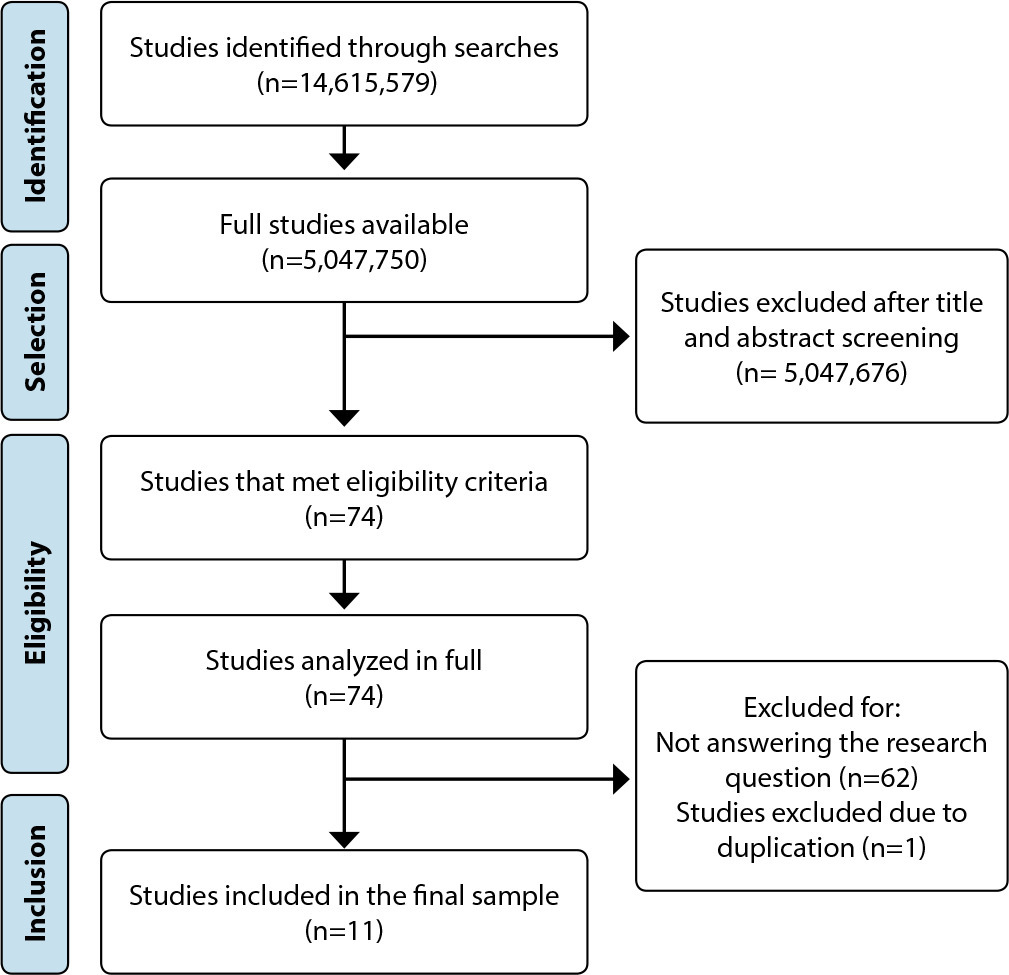
-
ORIGINAL ARTICLE12-04-2023
30-Year High Cardiovascular Risk Incidence and its Determinants: CUME Study
Revista Brasileira de Enfermagem. 2023;76(6):e20220544
Abstract
ORIGINAL ARTICLE30-Year High Cardiovascular Risk Incidence and its Determinants: CUME Study
Revista Brasileira de Enfermagem. 2023;76(6):e20220544
DOI 10.1590/0034-7167-2022-0544
Views0See moreABSTRACT
Objective:
Estimate the incidence of the 30-year high cardiovascular risk and its determinants among graduates of federal universities in Minas Gerais.
Methods:
This is a prospective cohort of 2,854 adults aged 20 to 59. The incidence of the outcome was calculated using the Framingham equation and its determinants were determined through multivariate Cox regression.
Results:
After an average of 2.62 years, the incidence of high cardiovascular risk was 8.09 and 20.1 cases per 1,000 person-years, for females and males respectively. Being male (HR: 2.34; 95% CI: 1.58 – 3.46), employment (HR: 2.13; 95% CI: 1.13 – 3.99), high consumption of processed foods (HR: 2.44; 95% CI: 1.21 – 4.90), and being physically active (HR: 0.63; 95% CI: 0.41 – 0.98) were associated with high cardiovascular risk.
Conclusions:
Among highly educated adults, being male, employment, and high consumption of processed foods are predictors of high cardiovascular risk, while being physically active acts as a protective factor.
-
ORIGINAL ARTICLE12-04-2023
“Fala-M@no-COVID-19”: technological development of a health navigation program for men during the pandemic
Revista Brasileira de Enfermagem. 2023;76(6):e20220534
Abstract
ORIGINAL ARTICLE“Fala-M@no-COVID-19”: technological development of a health navigation program for men during the pandemic
Revista Brasileira de Enfermagem. 2023;76(6):e20220534
DOI 10.1590/0034-7167-2022-0534
Views0See moreABSTRACT
Objective:
to develop a care-educational technology similar to a health navigation program for men during the COVID-19 pandemic.
Methods:
a methodological and qualitative study of a care-educational technology of health navigation program, structured by Program Development Cycle, with 16 patient navigators and 10 professional navigators. It used reflective thematic content analysis and an adaptation model for data processing.
Results:
the ; navigation program was developed by: I) Observation of reality, problem mapping, needs assessment: content selection, creation of domains and questions; II) Theoretical-conceptual and methodological definition, creation of product under the elaboration of care plans, based on theory, process and taxonomies by a flowchart of operationalization of actions; and III) Self-assessment: qualitative research with professional navigators.
Final considerations:
the technology developed, with theoretical and methodological support, allowed to derive a viable navigation program compatible with reality based on the audience’s needs.
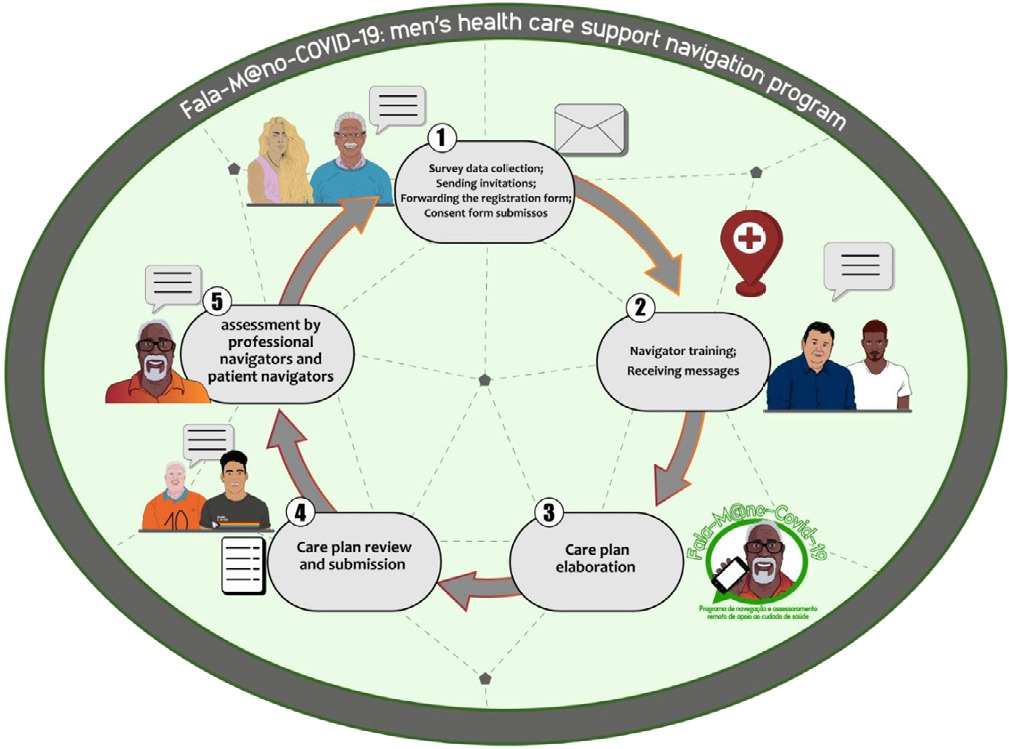
-
ORIGINAL ARTICLE12-04-2023
Social representation of young people in higher education about sexually transmitted infections
Revista Brasileira de Enfermagem. 2023;76(6):e20220406
Abstract
ORIGINAL ARTICLESocial representation of young people in higher education about sexually transmitted infections
Revista Brasileira de Enfermagem. 2023;76(6):e20220406
DOI 10.1590/0034-7167-2022-0406
Views0See moreABSTRACT
Objective:
to analyze the social representations about sexually transmitted infections elaborated by undergraduate students.
Methods:
a descriptive, qualitative study, in the light of the structural approach of Social Representation Theory, carried out with 160 young undergraduate students, in the second half of 2019, in the city of Rio de Janeiro. Data were collected using a sociodemographic characterization questionnaire, knowledge and practices for preventing sexually transmitted infections, analyzed using descriptive statistics and a form of free evocations with the inducing term STD, analyzed using prototypical and similarity analysis.
Results:
the representation’s possible central nucleus is composed of lexicons aids, disease and HIV; the peripheral system by syphilis, sex, condoms, gonorrhea, prevention, infection, carelessness, HPV, herpes, ignorance, treatment, fear, unprotected-sex and danger.
Final considerations:
social thinking about sexually transmitted infections is characterized by their recognition as diseases, which require barrier prevention measures, associating with unsafe sexual practices that arouse fear.

-
12-04-2023
The Medical Healing of Souls: a strategy for welcoming post-pandemic mental health
Revista Brasileira de Enfermagem. 2023;76(6):e20220331
Abstract
The Medical Healing of Souls: a strategy for welcoming post-pandemic mental health
Revista Brasileira de Enfermagem. 2023;76(6):e20220331
DOI 10.1590/0034-7167-2022-0331
Views0See moreABSTRACT
Objective:
to reflect on the applicability of the Medical Healing of Souls (MHS) by health professionals as a welcoming strategy in post-pandemic mental health.
Methods:
a theoretical and reflective study, based on Viktor Frankl’s philosophy, based on the book “The Doctor and the Soul, From Psychotherapy to Logotherapy” and scientific literature.
Results:
the study was structured in two discursive approaches: MHS in the field of health; The applicability of MHS in post-pandemic mental health care.
Final considerations:
MHS can be used in mental health care, in health emergencies, promoting a more humane performance of health professionals, facilitating the integration of inevitable suffering into a meaningful life.
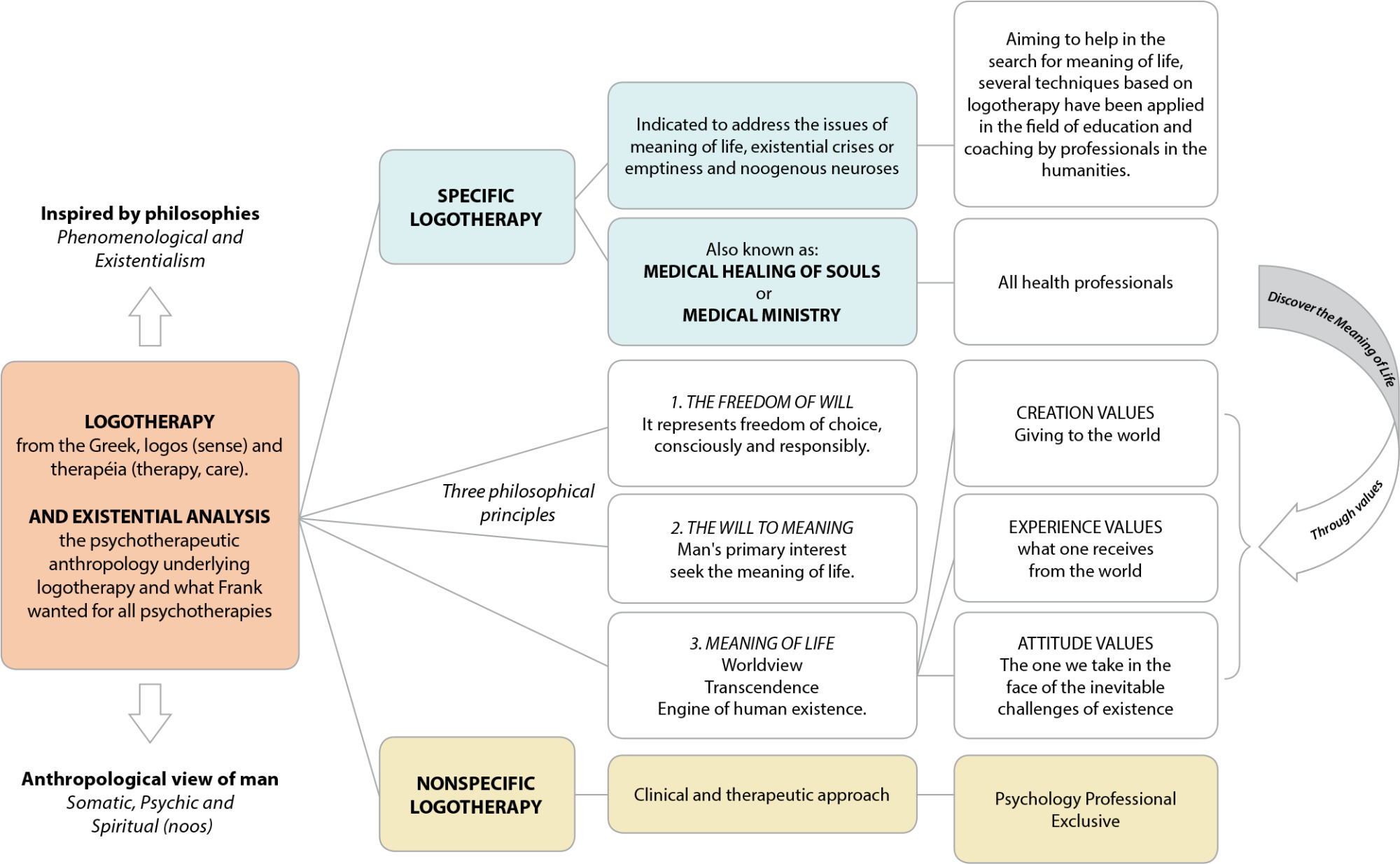
-
ORIGINAL ARTICLE12-04-2023
Translation, cross-cultural adaptation and validity study of the “Play Nicely Program: The Healthy Discipline Handbook” for use in Brazil
Revista Brasileira de Enfermagem. 2023;76(6):e20220281
Abstract
ORIGINAL ARTICLETranslation, cross-cultural adaptation and validity study of the “Play Nicely Program: The Healthy Discipline Handbook” for use in Brazil
Revista Brasileira de Enfermagem. 2023;76(6):e20220281
DOI 10.1590/0034-7167-2022-0281
Views0See moreABSTRACT
Objective:
to describe the translation, cross-cultural adaptation and validity process of the “Play Nicely Program: The Healthy Discipline Handbook” for use in Brazil.
Methods:
a methodological study that followed the translation, back-translation, expert committee assessment, and pre-test steps. The Content Validity Index (CVI) was calculated for both the judge population and the pre-test population. Four translators, seven expert judges in the field of child health and thirty participants in the pre-test, including parents, teachers and healthcare professionals, participated in the study.
Results:
in experts’ analysis (98.4%), a value of 100% of adequate assessments was obtained, and in the target population’s analysis (89.5%), there were 100% of adequate assessments. In both analyses, suggested adaptations were made.
Conclusios:
cross-cultural adaptation and content validity into Brazilian Portuguese of the “Play Nicely Program: The Healthy Discipline Handbook” were considered adequate for application in the target population.

-
ORIGINAL ARTICLE12-04-2023
Emergency units and COVID-19: Burnout, and empathy reported by nursing professionals and perceived by patients
Revista Brasileira de Enfermagem. 2023;76(6):e20210869
Abstract
ORIGINAL ARTICLEEmergency units and COVID-19: Burnout, and empathy reported by nursing professionals and perceived by patients
Revista Brasileira de Enfermagem. 2023;76(6):e20210869
DOI 10.1590/0034-7167-2021-0869
Views0See moreABSTRACT
Objective:
To investigate Burnout Syndrome and empathy self-reported by the nursing staff and empathy perceived by the patient.
Method:
Cross-sectional study in a public emergency unit in São Paulo (from October/2020 to March/2021). The nursing staff answered the Maslach Burnout Inventory and the Consultation and Relational Empathy Measure-Nurses (Brazilian version), whereas adult patients answered the Consultation and Relational Empathy Measure (Brazilian version). Descriptive and inferential analysis, with a 5% significance level.
Results:
A total of 92 professionals and 271 patients participated. Most professionals reported impact of COVID-19 (80; 86.96%) and, among them, increased Burnout Syndrome (93; 75%), but with low emotional exhaustion (71; 74%), low depersonalization (59; 78%) and high level of professional accomplishment (72; 83%). Most reported impact and increased empathy, and the results reported by professionals and patients (mean and standard deviation) were: 39.89 (6.44) and 38.25 (9.45), respectively.
Conclusion:
The professionals reported a low level of Burnout Syndrome and a high level of empathy in pandemic.
-
ERRATUM11-27-2023
ERRATUM
Revista Brasileira de Enfermagem. 2023;76(5):e2023n5e05
Abstract
ERRATUMERRATUM
Revista Brasileira de Enfermagem. 2023;76(5):e2023n5e05
DOI 10.1590/0034-7167.20237605e05
Views0In the article “Performance of Family Health Strategy Nurses in LGBT+ Healthcare”, with DOI number: , published in Revista Brasileira de Enfermagem, 2023;76(4): e20220514, authored:Where it read:[…]See more -
ORIGINAL ARTICLE11-27-2023
Mental suffering in family daily life: a temporal journey according to Merleau-Ponty
Revista Brasileira de Enfermagem. 2023;76(5):e20230258
Abstract
ORIGINAL ARTICLEMental suffering in family daily life: a temporal journey according to Merleau-Ponty
Revista Brasileira de Enfermagem. 2023;76(5):e20230258
DOI 10.1590/0034-7167-2023-0258
Views0See moreABSTRACT
Objectives:
to describe the family’s experience in relation to daily life with a family member experiencing mental suffering.
Methods:
a qualitative, descriptive, phenomenological study grounded in Merleau-Ponty’s ontology of experience was conducted in ten households in a city in the state of Bahia, Brazil, where 24 participants of the Intersubjectivity Wheels reside. The descriptions produced were subjected to the Ambiguity Analytics technique.
Results:
the descriptions were categorized into: absence as a creative power of the sense of “being” and “not being a family”; and exclusion and acceptance as expressions of mental suffering in the family context.
Final Considerations:
the experience of mental suffering in the family’s daily life is marked by ambiguous feelings, such as joy and sadness, disappointment and satisfaction, lack of love and love. However, experiencing these feelings can mobilize the desire to “become” a family, increase the sense of autonomy and independence, and drive the formation of new family configurations.
Search
Search in:
Nuvem de Tags
Adolescente (85) Atenção Primária à Saúde (239) COVID-19 (91) Criança (91) Cuidados de Enfermagem (269) Educação em Enfermagem (151) Educação em Saúde (139) Enfermagem (930) Enfermagem Pediátrica (86) Estudantes de Enfermagem (77) Estudos de Validação (131) Família (87) Idoso (208) Promoção da Saúde (99) Qualidade de Vida (104) Saúde do Trabalhador (86) Saúde Mental (145) Saúde Pública (82) Segurança do Paciente (150) Tecnologia Educacional (100)



